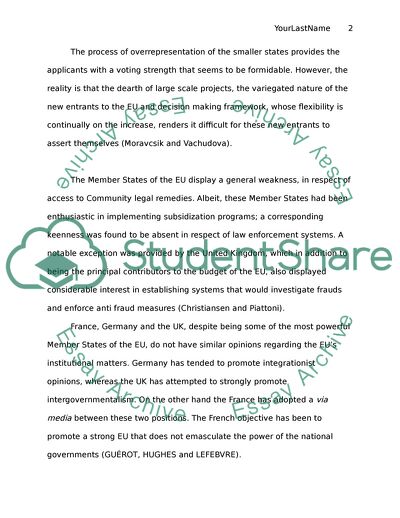
- Home
- Free Samples
- Premium Essays
- Editing Services
- Extra Tools
- Essay Writing Help
- About Us
- Studentshare
- Subjects
- Miscellaneous
- European Union Politics
European Union Politics - Essay Example

- Subject: Miscellaneous
- Type: Essay
- Level: Ph.D.
- Pages: 4 (1000 words)
- Downloads: 0
- Author: hahnconner
Extract of sample "European Union Politics"
This expansion of the EU is accompanied by considerable domestic strife. However, the losses on account of such strife are in general, negligible, unavoidable and in the long term they prove to be of significant benefit. It would be justified to assume that a country on obtaining membership of the EU would utilize its voting and veto power, in order to acquire resources (Moravcsik and Vachudova). The process of overrepresentation of the smaller states provides the applicants with a voting strength that seems to be formidable.
However, the reality is that the dearth of large scale projects, the variegated nature of the new entrants to the EU and decision making framework, whose flexibility is continually on the increase, renders it difficult for these new entrants to assert themselves (Moravcsik and Vachudova). The Member States of the EU display a general weakness, in respect of access to Community legal remedies. Albeit, these Member States had been enthusiastic in implementing subsidization programs; a corresponding keenness was found to be absent in respect of law enforcement systems.
A notable exception was provided by the United Kingdom, which in addition to being the principal contributors to the budget of the EU, also displayed considerable interest in establishing systems that would investigate frauds and enforce anti fraud measures (Christiansen and Piattoni). France, Germany and the UK, despite being some of the most powerful Member States of the EU, do not have similar opinions regarding the EU’s institutional matters. Germany has tended to promote integrationist opinions, whereas the UK has attempted to strongly promote intergovernmentalism.
On the other hand the France has adopted a via media between these two positions. The French objective has been to promote a strong EU that does not emasculate the power of the national governments (GUÉROT, HUGHES and LEFEBVRE). On several counts, France has emerged as
...Download file to see next pages Read MoreCHECK THESE SAMPLES OF European Union Politics
Problems of trust within EU integration process
Constitutional Law of the European Union
Principle European Union Institutions
Economic Consequences of Globalization in European Countries and the Rest of the World
The European Union: Politics
The European Union and the Member States
EU Law - the Behavior of the Government of France
Historical Factors and Theories of Integration which Led to the Formation of the European Union

- TERMS & CONDITIONS
- PRIVACY POLICY
- COOKIES POLICY